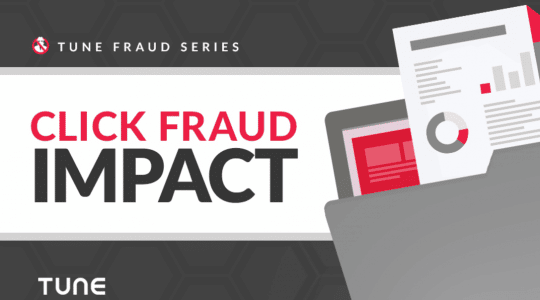Google Analytics won’t work for tracking affiliate marketing campaigns and activities. Here’s why.
Every year, more and more digital advertisers are increasing their advertising spend with affiliate marketing programs and campaigns, while interest in the industry continues to set new all-time highs. However, too many of these advertisers are relying on Google Analytics to track conversions. While this is a useful way to reconcile sales, it’s a bad way to work with affiliates and affiliate networks.
Why?
Google Analytics ≠ Affiliate Tracking Software
Let’s set the record straight here. Google Analytics is not affiliate tracking software. Google Analytics is web analytics software. And there is a very big difference between the two.
Affiliate tracking software like TUNE is purpose-built for measuring and managing affiliate marketing activities. It comes with native tools and features that allow you to effectively onboard, organize, and work with different affiliate partners as well as performance-based advertising networks.
On the other hand, web analytics software like Google Analytics is built to report on online performance and audiences. It can also give you basic insights into mobile. (That is, of course, as long as your audience and performance are on your site — there is no off-site tracking in GA.) And that’s it. Google Analytics does not provide the tools needed to manage affiliate partners and networks, nor does it have the capability to do so.
Issues With Using Google Analytics for Affiliate Marketing
If you’re still not convinced that a separate solution is the way to go, here are just a few problems you’ll encounter when trying to use web analytics software to manage affiliates:
- There is no system to generate/display affiliate pixels or postback URLs, which are required to track conversions on mobile and web.
- Placing affiliate pixels/postback URLs directly on a web page causes duplicate conversions.
- There is no interface provided for affiliate self-management (browse offers, get creative assets, check results, etc.)
- There is no way to set or manage affiliate payouts.
- There is no way to generate or manage invoices.
- There is no system for communicating with groups of affiliates or an entire program.
- There is no system to measure off-site or cross-site performance.
Example Issue: Conversion Discrepancies
To give you an idea of how this translates into real life, here’s an excerpt pulled from an old TUNE support request. It’s from a manager at an affiliate network working with an advertiser who uses Google Analytics for tracking:
I have a discrepancy with my advertiser, XXXXX. They show 60% fewer leads (20 vs our 64) than us this month. I sent them the IPs associated with all the leads that tracked in TUNE, and he found that some of these IPs come from some of their other publishers and not us. I’m not clear why I’m tracking some other publisher leads in my network.
Advertiser XXXXX above is using Google Analytics to track their affiliate marketing conversions. The affiliate network, a TUNE customer, provided the advertiser with their third-party conversion pixel in order to track the network’s conversions. Advertiser XXXXX placed the network’s conversion pixel in the code directly on their confirmation page, but separate from their Google Analytics tracking code. For this reason, the affiliate network recorded a conversion for every sale that had an active user tracking session associated with it, even when another publisher was responsible for the conversion.
This is a clear case where the advertiser needs a system to manage affiliate conversions. Affiliate tracking software enables advertisers to accurately identify and record an affiliate’s conversion pixels/postback URLs only when they should be credited for a conversion — not every time a conversion happens.
In the above case, advertiser XXXXX should have associated the affiliate network’s pixel with 20 conversions. If advertiser XXXXX had been using affiliate tracking software, it would have ensured that the network’s pixel was displayed 20 times — in other words, only when the advertiser was going to credit that particular network for a conversion.
In Conclusion
Despite all of these issues, Google Analytics is still a useful tool when applied in the proper situations. We’re big fans of integrating affiliate tracking software with Google Analytics for more insights.
If you’re a TUNE customer, you can learn how to integrate Google Analytics with your TUNE platform here. For a general guide, read up on tracking individual affiliate activity along with the rest of your marketing channels in this article: Integrating Google Analytics with Affiliate Tracking Software.
If you take one thing away from today, however, please make it this: Google Analytics is a reporting tool, not an affiliate tracking and management solution. If you’re an advertiser (or know of one) who runs affiliate marketing campaigns using only Google Analytics, pass this post along. It may save someone from wasting their time and money, or more importantly, from ruining an awesome business relationship!
This post was originally published in January 2012 and has been updated for accuracy and comprehensiveness.
Author
Becky is the Senior Content Marketing Manager at TUNE. Before TUNE, she handled content strategy and marketing communications at several tech startups in the Bay Area. Becky received her bachelor's degree in English from Wake Forest University. After a decade in San Francisco and Seattle, she has returned home to Charleston, SC, where you can find her strolling through Hampton Park with her pup and enjoying the simple things between adventures with friends and family.




Great points Lucas – knowing the limitations of Google Analytics is key; yes, it’s a great tool to have, but it should be considered complimentary to your affiliate tracking software, not its replacement. It’s important to realize that one is good for some metrics, one is good for the other, and trying to combine them or force one to do the other just creates too much room for error. Thanks for the post.
Dustin,
Clearly you get it. It’s nice to hear someone understand the importance of both; understanding your site analytics and tracking your affiliate marketing efforts.
Did you have a chance to check out Lucas’ other post about integrating your affiliate tracking within your Google Analytics?
Hope you enjoy,
Trevor
The scenario is very badly explained. Consider personifying the various parties, e.g. ‘dangle.com, an affiliate and publisher for acme products’.
Hmm agreed, lots of words but makes no sense. It sounds like maybe Lucas is saying an affiliate configured a page wrong and got bad data. But I still have no idea what was wrong, or why it could not have been done correctly with GA.
same here. The example confused me. “the affiliate recorded a conversion for every sale” should probably read “the advertiser recorded a conversion for every sale”